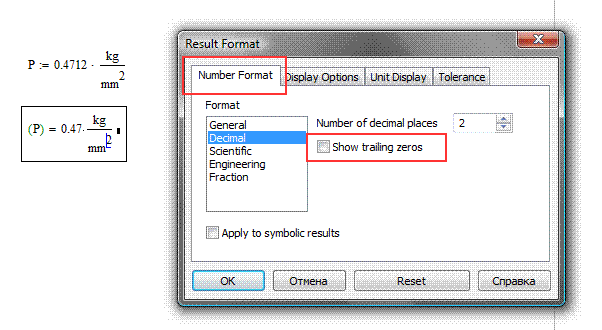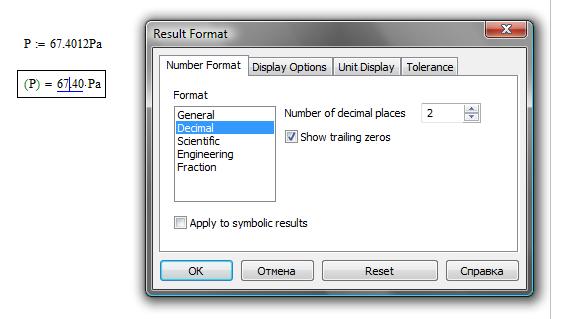Community Tip - Want the oppurtunity to discuss enhancements to PTC products? Join a working group! X
- Subscribe to RSS Feed
- Mark Topic as New
- Mark Topic as Read
- Float this Topic for Current User
- Bookmark
- Subscribe
- Mute
- Printer Friendly Page
How to format units?
- Mark as New
- Bookmark
- Subscribe
- Mute
- Subscribe to RSS Feed
- Permalink
- Notify Moderator
How to format units?
Hi Richard,
There is an expression in my calculation which is shown as following:

I want to format the result of P as the following pattern:

So I format the result as following steps:
- Select “Result” from “Format” menu.
- Select “Number Format” tab
- Select “Decimal” item from “Format” list
- Change the “Number of Decimal” from “3” to “2”
- Click on “Show trailing zeros”
- Select “Unit Display” tab
- Click on “Format units”
- Click on “Simplify units when possible”
But the result is shown as following:

Is it possible to remove the tailing zeros from “2.00” in the units? If possible, can you tell me the steps in detail?
Best regards.
Jeffery
Solved! Go to Solution.
- Labels:
-
Other
Accepted Solutions
- Mark as New
- Bookmark
- Subscribe
- Mute
- Subscribe to RSS Feed
- Permalink
- Notify Moderator
- Mark as New
- Bookmark
- Subscribe
- Mute
- Subscribe to RSS Feed
- Permalink
- Notify Moderator
I don't see your problem.
I have just defined P and manually type the units in and got the following.
Mike
- Mark as New
- Bookmark
- Subscribe
- Mute
- Subscribe to RSS Feed
- Permalink
- Notify Moderator
Hello!
You do not need to choose "Show trailing zeros".

- Mark as New
- Bookmark
- Subscribe
- Mute
- Subscribe to RSS Feed
- Permalink
- Notify Moderator
Hi VladimirN.,
If the number before the unit is "0.4012", and I still want to keep 2 "Number of decimal", the result is shown as following:
But the result I want to get is shown as following:

Is there any way to keep the "0" after the number "0.4".

Best regards.
Jeffery.
- Mark as New
- Bookmark
- Subscribe
- Mute
- Subscribe to RSS Feed
- Permalink
- Notify Moderator
In this case, use those units, which are offered by Mathcad.

- Mark as New
- Bookmark
- Subscribe
- Mute
- Subscribe to RSS Feed
- Permalink
- Notify Moderator
Sorry.
Is P a pressure?
If yes - the unit of pressure is kgf/mm^2.
kg/mm^2 is a strange unit ![]()
Can you point me one physical quantity with this unit!
- Mark as New
- Bookmark
- Subscribe
- Mute
- Subscribe to RSS Feed
- Permalink
- Notify Moderator
Hi Valery,
Thank you. I think there is no problem with the units.
- Mark as New
- Bookmark
- Subscribe
- Mute
- Subscribe to RSS Feed
- Permalink
- Notify Moderator
Thank you. I think there is no problem with the units.
To be honest I have to agree with Valery here. I have never seen kg/mm^2 used before. I would use kgf/mm^2.
Mike
- Mark as New
- Bookmark
- Subscribe
- Mute
- Subscribe to RSS Feed
- Permalink
- Notify Moderator
Jeffery Gu wrote:
Hi Valery,
Thank you. I think there is no problem with the units.
OK!
But for me it is very interesting what physical quantity has this unit ![]()
I know linear density with unit kg/m, density with unit kg/m^3.
May be kg/m^2 is an unit of square density!?
- Mark as New
- Bookmark
- Subscribe
- Mute
- Subscribe to RSS Feed
- Permalink
- Notify Moderator
Hi Mike,
Have you kept the "Show trailing zeros” checked?
Jeffery
- Mark as New
- Bookmark
- Subscribe
- Mute
- Subscribe to RSS Feed
- Permalink
- Notify Moderator
Jeffery,
I looked at your test sheet, under Tools>Worksheet Options> Unit System, you have checked Custom units, based on SI,
Just curious why?
Also, if you look under Insert>Unit you will see a list of available units in the system you choose, in this case SI (even though Custom was selected)
For example, I would use MPa or KPa, instead of kgf/mm^2
Also, most users (I believe) like to check Format>Result>Unit Display> Format units
- Mark as New
- Bookmark
- Subscribe
- Mute
- Subscribe to RSS Feed
- Permalink
- Notify Moderator
No, I kept the box unchecked.
Mike
- Mark as New
- Bookmark
- Subscribe
- Mute
- Subscribe to RSS Feed
- Permalink
- Notify Moderator
Mike,
Not important, but just curious, when the Format Units Box is checked, you get the fractional form, like m/s^2
Unchecked you get m*s^-2.
I clarify the above because I think Help has it reversed.
So, when you want the units displayed in the final document, which format do you use?
If you want the m/s^2 format, but your default is unformatted, then you must re-type the unit, an extra step.
If I have complicated set of units, the unformatted is harder to resolve, at a glance, than the formatted?
And lastly, do you enter the units in the result as m*s^-2 or as m/s^2?
Just curious, ![]()
- Mark as New
- Bookmark
- Subscribe
- Mute
- Subscribe to RSS Feed
- Permalink
- Notify Moderator
Not important, but just curious, when the Format Units Box is checked, you get the fractional form, like m/s^2
Unchecked you get m*s^-2.
I clarify the above because I think Help has it reversed.
I can't see in the help where they talk about m*s^-2 sorry Wayne.
So, when you want the units displayed in the final document, which format do you use?
I always bring the units up to the top line - N*mm^-2, m*s^-2,m kg*m^-1. This is standard practice for my calcs.
If you want the m/s^2 format, but your default is unformatted, then you must re-type the unit, an extra step.
If I have complicated set of units, the unformatted is harder to resolve, at a glance, than the formatted?
I did a little research a while back and found a quick way to insert units (the only way except typing I think), but it requires another program running in the background - AutoHotkey. I like it and it saves a bit of time and effort ![]()
Mike
- Mark as New
- Bookmark
- Subscribe
- Mute
- Subscribe to RSS Feed
- Permalink
- Notify Moderator
Mike,
Under "Simplifying Displayed Units"
The directions for unformating are correct, but the statment in the simple example is reversed, the last result is unformated, not the formated result.
Trivial I know, but what else have I to do?
PS
kg/m^2 would be the unit mass of a plate, for example in the calculations for vibration of a plate.
- Mark as New
- Bookmark
- Subscribe
- Mute
- Subscribe to RSS Feed
- Permalink
- Notify Moderator
Hi friends,
Thanks and regards.
Jeffery
- Mark as New
- Bookmark
- Subscribe
- Mute
- Subscribe to RSS Feed
- Permalink
- Notify Moderator
Jeffery,
Recently, Valery Ochkov has shown a solution of a problem, described earlier, here:





